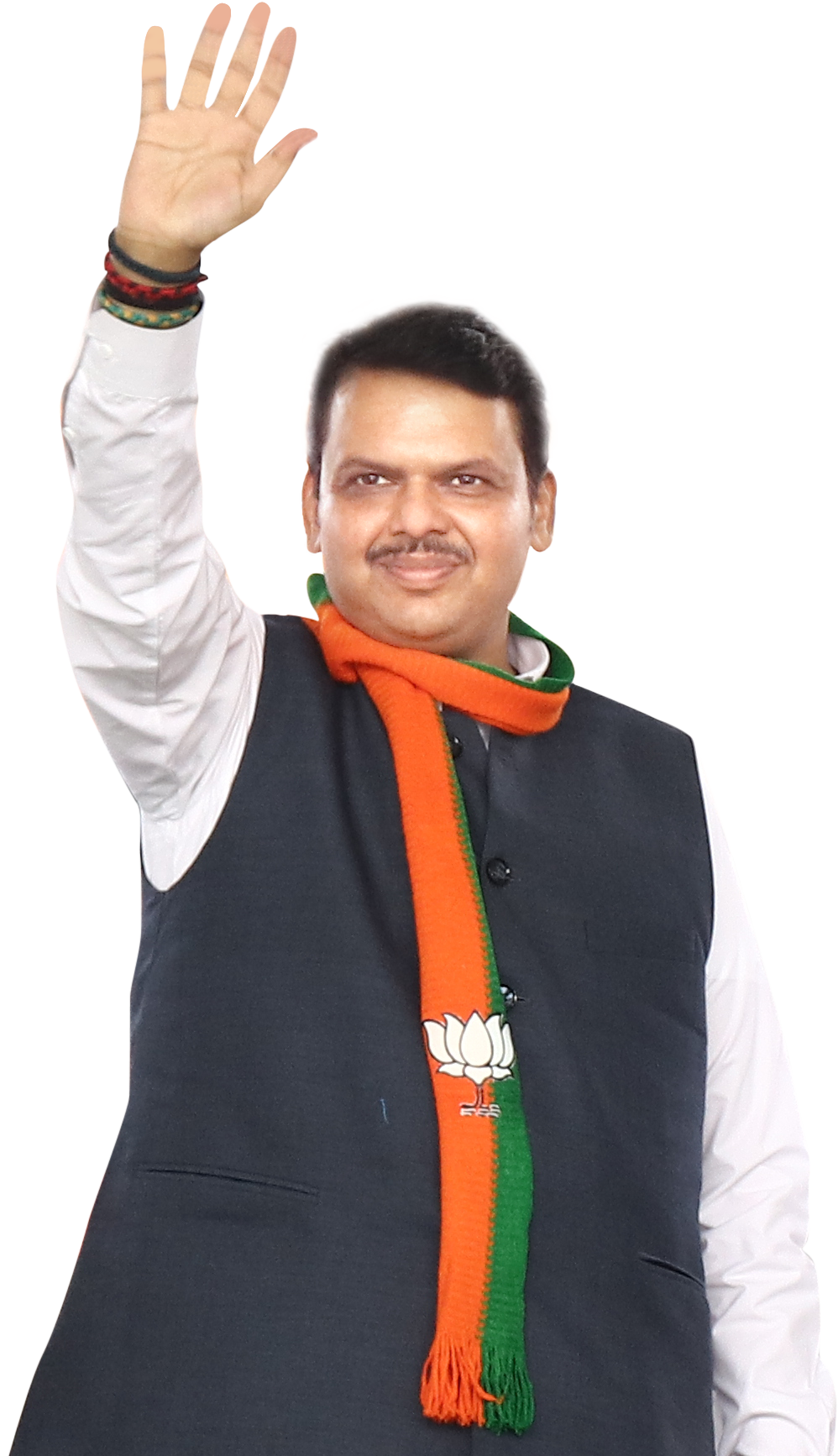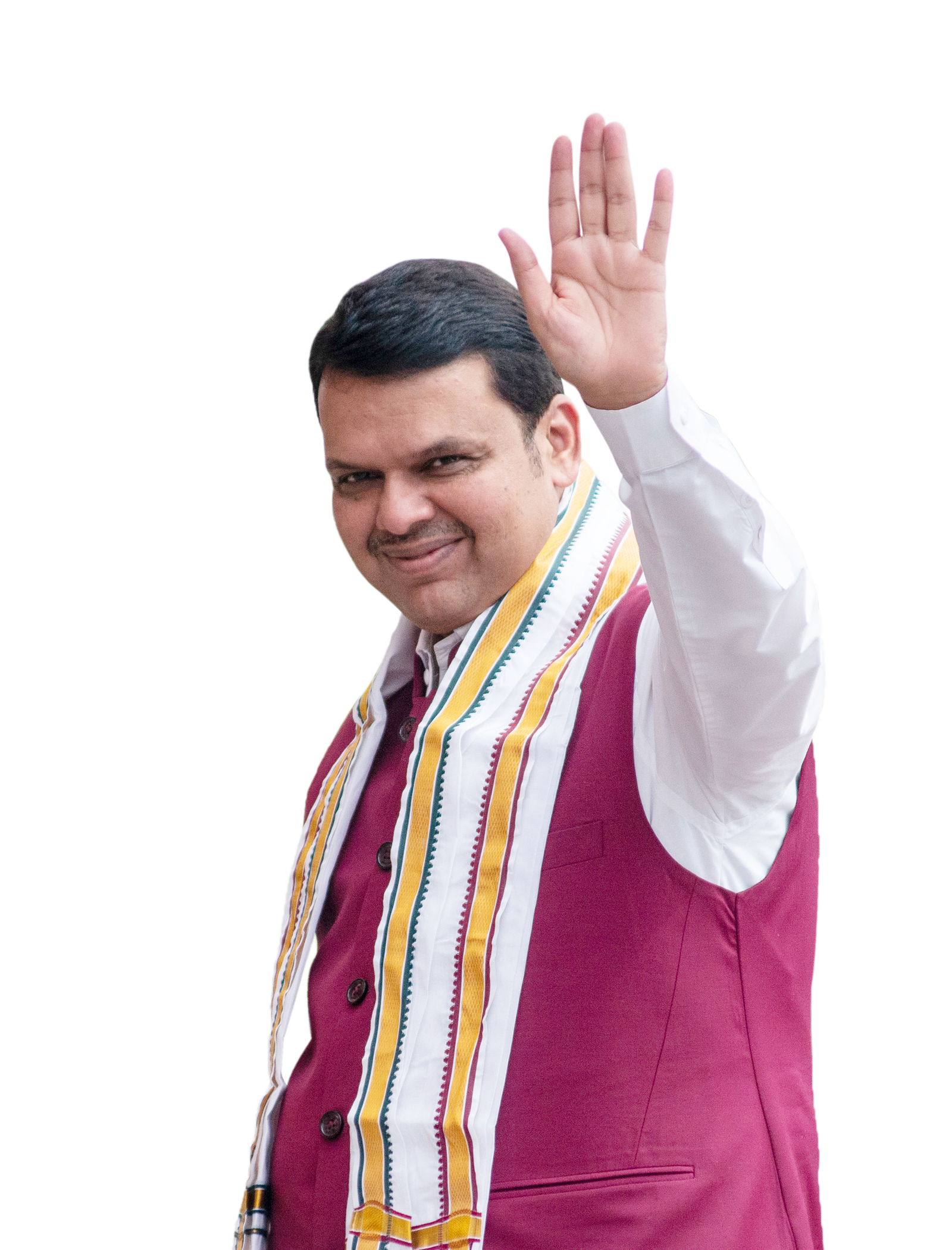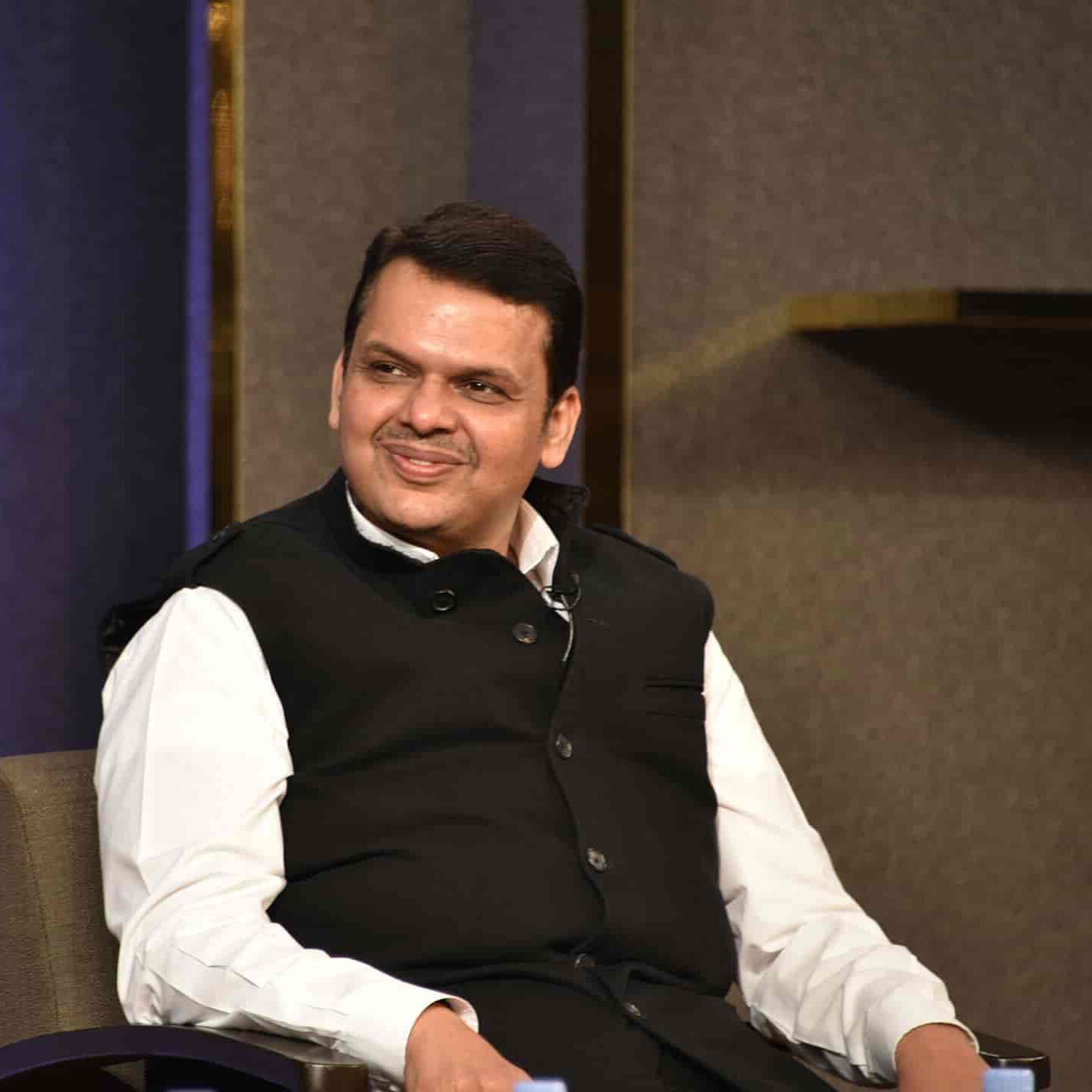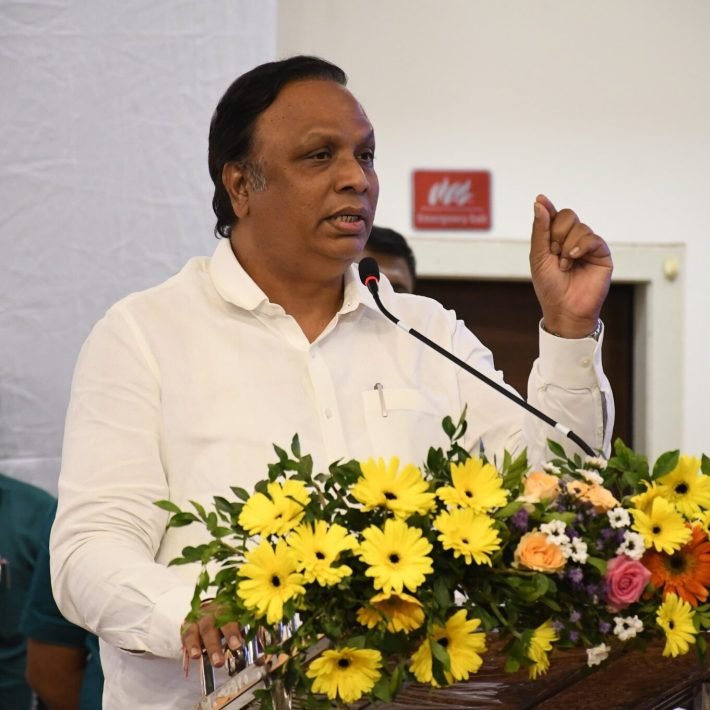Devendra Fadnavis, Hon. Deputy Chief Minister of Maharashtra, delves into the State Government’s developmental achievements over 14 months. He shares insights on how Maharashtra is transforming into a powerhouse of progress and innovation.
By Andrea CostaBir
To Protect & Serve
The Art & Security Of ‘Home Affairs’
The Government of Maharashtra has undertaken several significant decisions, this past year, to tackle pressing issues and enhance overall governance. The repeal of the Maharashtra Casino (Control and Tax) 1976 Act signifies an evolving policy landscape in response to societal needs. Concurrently, the withdrawal of chargesheets linked to political and social agitations up to June 2022 reflects a commitment to reconciliation and conflict resolution. The state’s resolute approach to combatting drug consumption is evident through the arrest of 14,201 accused individuals and the seizure of drugs worth ₹5,380 crore.

Emphasis has also been put on looking after the well-being of law enforcement personnel, with reforms like increasing casual leave entitlement and rapid recruitment efforts already in effect. Safeguarding our state remains at the forefront, and to this end notable investments in security and surveillance, exemplified by the installation of CCTV cameras and a robust cyber security project, have been made. Plans for constructing new jails and prison reforms underscore the commitment to effective inmate management and rehabilitation. Moreover, the creation of a Special Commissioner of Police post in Mumbai aims to bolster law enforcement and elevate security measures in urban areas.
Powering Forward
A Burst Of ‘Energy’

Maharashtra is making significant strides in the energy sector, with several promising initiatives gaining traction. The State Government has approved substantial investments, including ₹239,602 crore for Mahavitaran and ₹3,461 crore for BEST, to bolster power distribution infrastructure. Notably, Maharashtra has emerged as the first state in India to announce a comprehensive green hydrogen policy, committing ₹8,652 crore to promote this sustainable energy source. Agriculture remains a top priority, with the introduction of the ‘Mukhyamantri Saur Krushi Vahini Yojana’ designed to convert 30% of agricultural electricity feeders to solar energy. This forward-looking approach is set to benefit lakhs of farmers across the state. Moreover, efforts are underway to expedite the provision of immediate electricity connections to 86,073 pending agricultural pump applications, ensuring access to power for rural agriculture. In a significant move to enhance energy production, the state has entered into Memorandums of Understanding (MoUs) worth ₹44,000 crore and ₹27,000 crore with the National Hydro Power Corporation Limited and Torrent Power Limited, respectively. These agreements pave the way for the development of hydroelectric projects, positioning Maharashtra as a key player in the green energy landscape.
Nurturing Enterprises From The Ground Up
‘Industries’ Lead The Way
Maharashtra continues to foster a robust investment climate, with a series of initiatives and partnerships aimed at attracting investments and driving economic growth. During the last year and the first quarter of 2023-24, Maharashtra is the top ranking state, attracting the highest FDI in India. MoUs worth ₹1.37 lakh crore have been signed in Davos, further boosting the state’s economy, while projects valued at ₹87,000 crore are actively under construction. The approval of the new Information Technology and IT-enabled Services (ITeS) Policy is expected to attract investments totalling ₹97,000 crore, enhancing the state’s digital infrastructure. An additional ₹70,000 crore worth of projects approved in a cabinet sub-committee meeting is set to create 55,000 jobs. The state brought in a new labour policy. Moreover, the new textile policy is expected to attract ₹25,000 crore worth of investment. Maharashtra has also become the first state to have a green hydrogen policy which will help in securing energy independence. Maharashtra’s first Electronics Manufacturing Cluster project in Ranjangaon highlights the Government’s commitment to technology and manufacturing. Over 12,000 entrepreneurs have been supported through the ‘Mukhyamantri Rojgar Nirmiti Yojana’, providing employment opportunities for more than one lakh youth, with 12,326 loans approved this year alone. The implementation of blockchain technology for caste certificate validation in Etapalli marks a leap in digital governance. Collaborative efforts with the Centre through the ‘Sankalp Project’ are addressing challenges faced by entrepreneurs across various sectors. ₹1,000 crore has been allocated for the Dhangar community, with the establishment of the Maharashtra Sheep and Goat Cooperative Development Corporation (MSGCDC). Plans to establish nine logistics parks in strategic locations and a MoU between National Highways Logistics Management Limited and Jawaharlal Nehru Port Trust (JNPT) for the development of a Multi-Modal Logistics Park (MMLP) in Jalna further enhance trade and connectivity. The investment of approximately ₹4,200 crore by JSW in Konkan, including the construction of a 960 MV Hydro Pumped Storage Project (PSP) in Pen, demonstrates the state’s commitment to innovation and sustainable energy. To support industries, the extension of the period for industrial incentive grants by two years streamlines processes and facilitates the approval of refund claims. These initiatives collectively represent a holistic approach to economic development and investment attraction in Maharashtra, aiming to foster growth, create jobs, and enhance the state’s overall economic landscape.
A Healthy Approach
‘Public Health’ – Of Prime Importance

Maharashtra is making significant strides in the healthcare sector, with a series of measures aimed at improving access and quality of care. The Government has introduced free treatment and screening tests at all Government hospitals, ensuring access to essential medical services without financial barriers. Furthermore, to address staff shortages in the medical services sector, vacancies are being actively filled to bolster healthcare infrastructure. Insurance cover under Mahatma Phule Jan Arogya Yojana has increased to ₹5 lakhs from the earlier ₹1.5 lakhs, and every citizen of the state is now covered under this scheme providing health coverage to those in need. A substantial allocation of ₹112 crore from the Chief Minister’s Relief Fund is being used to provide financial assistance to impoverished and needy patients, offering a lifeline to those facing medical expenses. The state is also streamlining healthcare access by integrating the ‘Mahatma Jyotirao Phule Jan Arogya Yojana’ and ‘Ayushman Bharat Pradhan Mantri Arogya Yojana’ with the distribution of 2 crore health cards, granting coverage of up to ₹25 lakh, significantly improving access to quality healthcare services. For Marathi-speaking communities in 865 border villages, the ‘Mahatma Jyotirao Phule Jan Arogya Yojana’ is being implemented. Efforts to reduce the infant mortality rate include the establishment of special wards for treating sick newborns in tribal areas, neonatal stabilisation rooms, neonatal care corners, pediatric centers, and nutritional rehabilitation centers, significantly improving healthcare for mothers and newborns. In addition, the ‘Matrutva Anudan Yojna’ has benefited 68,365 mothers. To focus on women’s health, the ‘Mata Surakshit Tar Ghar Surakshit’ campaign is conducting health checkups for 4 crore women and providing necessary medications. Each district has received ₹2 crore in funding for this vital initiative, ensuring women’s health and well-being are prioritised. Recognising the essential role of Asha workers and Anganwadi workers in healthcare delivery, their salaries have seen increments of ₹1,500 per month, acknowledging their dedication and contribution to the healthcare system. Furthermore, to enhance primary healthcare services, 700 ‘Aapla Davakhana’ (health clinics) named after Bal Thackeray are being established, with a total approved budget of ₹210 crore, including 160 health centers in Mumbai.
Leveling Up
‘Information Technology’ Rules The Roost!
The Maharashtra Government is actively embracing digital advancements and improving its information technology infrastructure to enhance service delivery and connectivity.

The new Information Technology policy has been adopted and is expected to attract ₹9500 crore worth of investment. One significant initiative is the ‘Maharashtra Unified Citizen Data’ project, which is currently underway, aiming to streamline the delivery of digital services to the citizens. Plans are in motion to connect all gram panchayats with a high-capacity fiber network, ensuring that even rural areas have access to high-speed internet. The state is also making strides with the ‘Urban MahaNet’ programme, connecting over 25,000 urban offices to improve urban network connectivity. Efforts to expand infrastructure for 5G technology are ongoing, with a particular focus on setting charges for laying optical fiber cables and addressing other essential components. As part of this digital transformation, the State Government has introduced a new website, reflecting its commitment to providing efficient and accessible online services to the people of Maharashtra. These initiatives collectively represent a significant step forward in the state’s technological advancement, with the aim of offering improved digital services to its residents.
A Leap In The Right Direction
‘Urban Development’ Strides Ahead
Mumbai, India’s financial capital, is on the brink of an economic transformation, backed by significant support from NITI Aayog. A dedicated team of senior state officials has been entrusted with the task of crafting a master plan to drive this ambitious endeavour. The Mumbai Trans Harbour Link (MTHL) is over 95% complete and will be named as ‘Atal Bihari Vajpayee Smruti Shivdi Nhava Sheva Atal Setu’ in memory of the former Prime Minister.

The Metro routes 2A and 7 are operational and benefitting lakhs of commuters. The government’s commitment to cleanliness and sanitation is evident through the launch of the ‘Swachh Maharashtra Mission (Urban) 2.0’, supported by an allocation of ₹12,401 crore. Furthermore, the launch of Asia’s largest cluster development scheme in Thane aims to construct 10,000 houses in its first stage. The city of Mumbai is also witnessing a significant push for beautification projects, with substantial financial provisions. Road repair efforts have made progress, with concretisation of 110 km of roads already completed and 400 km more on the way. Cluster redevelopment too has been given a big boost by offering 50% concession in development cess. The introduction of the Chief Minister’s ‘Swachh Mumbai WhatsApp Helpline’ too is helping change the city’s face. On the education and research front, international institutions are gearing up to establish campuses within the Navi Mumbai Special Economic Zone (NMSEZ), attracting a remarkable investment of ₹60,000 crore and the promise of one lakh jobs. Infrastructurewise, the Navi Mumbai International Airport is set to begin operations in December 2024, with a proposal to name it after DB Patil awaiting approval. The Mumbai Metropolitan Region Development Authority (MMRDA) has secured approval to raise funds up to ₹60,000 crore for a range of projects. Besides all this, Metro work is in full swing in Mumbai, Pune, and Nagpur. A land measuring 174 hectares in Mogharpada, Thane, has been handed over to MMRDA for the construction of a car depot servicing Metro 4, 4A, 10, and 11. The SwargateKatraj underground metro extension proposal has been sent to the Centre for approval, while the PCMC to Bhakti-Shakti Chowk in Nigdi extension was recently approved. NITI Aayog has started a new initiative called G-HUB meaning ‘Growth Hubs’, to develop city-regions as Growth Hubs. Initially, 4 cities are being developed on a pilot basis and Mumbai is one of them.
Paving The Way
‘Public Works’ Enhances Transformative Progress

The renaming of the Versova-Bandra Sea Link to ‘Swatantryaveer Savarkar Sagari Setu’ marks a significant moment in Maharashtra’s history. The establishment of the Maharashtra State Infrastructure Development Corporation reflects the Government’s commitment to robust infrastructure projects. A total of 9,088 road development projects, valued at ₹25,782 crore and approved from July 2022 to May 2023, emphasise the state’s dedication to enhancing its road network. Notably, the ongoing widening of the Bhiwandi-Kalyan-Shilphata six-lane road, with projects worth ₹561.85 crore, seeks to improve connectivity and traffic flow. A remarkable ₹22 crore water supply project at the solar power plant in Paldhi, Jalgaon, underscores the state’s commitment to sustainable development. A substantial allocation of ₹86,300 crore for the Pavnar (Wardha) and Patradevi (Sindhudurg) Maharashtra Shaktipeeth Mahamarg demonstrates the Government’s focus on holistic development. The anticipated opening of the ‘missing link’ of the Mumbai-Pune Expressway next year will bring a significant improvement in transportation infrastructure. Moreover, the allocation of funds for the construction of the Virar-Alibaug Expressway and the Revas-Reddi Coastal Highway signifies the Government’s dedication to enhancing connectivity along the coastal areas. The ambitious Hybrid Annuity Model aims to upgrade a total of 9,965 km of roads, with substantial progress already made on 3,700 km of these routes. The upcoming Phase 2 of this model will further improve 7,544 km of roads, ensuring a comprehensive network of well-maintained roadways. Finally, the proposal to construct a 5,000 km network of highways and expressways reflects the state’s commitment to extensive infrastructure development, promising better connectivity and accessibility across Maharashtra. Furthermore, the upcoming renaming of the Chipi Airport in Sindhudurg after Nath Pai epitomises the state’s whirlwind of activity and transformative progress.
The Seeds Of Growth
‘Agriculture’ Grows The State Plentifully

Maharashtra is making substantial investments in the agricultural sector. The criteria for relief after incessant rains was introduced, which has benefitted lakhs of farmers who have received more than ₹12,000 crores till now. A total of ₹1,500 crore will be transferred to the farmers. Under the ‘Namo Shetkari Maha Samman Nidhi Yojana’, the Government is providing ₹6,000 per year to each farmer, benefiting around 90 lakh families, significantly improving their financial stability. Along with this ₹6000 from the Central Government (PM Kissan Samman Nidhi) will be provided as an equal and additional contribution from the Government. The state is also taking steps to safeguard farmers by offering crop insurance for just ₹1, allocating a budget of ₹3,312 crore for the initiative, with over 1.5 crore farmers registered for this scheme. To further enhance agricultural development, a budget of ₹3,000 crore has been allocated for the ‘Maha Krishi Vikas Abhiyan’ over the next five years. Additionally, ₹5,132 crore will be given to over 14 lakh farmers under the incentive scheme. Maharashtra is expanding the ‘Magel Tyala Shettale Yojana’ with an expenditure of ₹1,000 crore. This scheme will benefit over 5,000 villages. Moreover, 35 irrigation projects have been given renewed administrative approval to help irrigate an additional 8 lakh hectares of land. Besides, a new law is set to be introduced to protect farmers from being cheated when purchasing counterfeit seeds, fertilizers, and pesticides. The establishment of the Cashew Board and the allocation of ₹200 crore for the Maharashtra Millet Mission all aim to boost the agricultural economy. Additionally, the ‘Gopinath Munde Surksha Sanugraha Yojana’ offers farmers security with benefits of up to ₹2 lakhs. The creation of the Agricultural Training Center in Nagpur, 6 Orange Processing Centres in Vidarbha, International Agricultural Facilitation Centre, the Bal Thackeray Turmeric Research and Training Centre in Hingoli, and a Maize Research Centre in Sillod, Maharashtra, will ensure that farmers have access to resources and knowledge to thrive. The state has also taken significant steps in improving irrigation infrastructure, with 144 projects approved under the ‘Pradhan Mantri Krishi Sinchan Yojana 2.0’, covering 5.65 hectares in 30 districts. Onion farmers were given ₹300 crore grants as relief for losses incurred. These extensive measures reflect the state’s dedication to the welfare and prosperity of its farmers and the development of its agricultural sector.
Strengthening Partnerships
Maharashtra Powers Ahead With Japanese Collaboration…
The benefits to Maharashtra from the trip to Japan
• Assurance of funding for Versova-Virar Sea Link, Metro 11 (Chhatrapati Shivaji Maharaj Terminus to Wadala), Mumbai Flood Management Project.
• Development of areas near metro stations.
• 4th-5th tranche of funding from JAICA for Metro-3, plus praise for clearing all hurdles in Metro-3.
• Construction and Management Technology for Highways and Steel Panel Roads.
• Sumitomo’s investment in the construction sector in third Mumbai due to MTHL also guarantees cooperation in high-rise buildings outside metro stations.
• Collaboration to develop start-up hub in Pune.
• Investing in the semiconductor sector as well.











